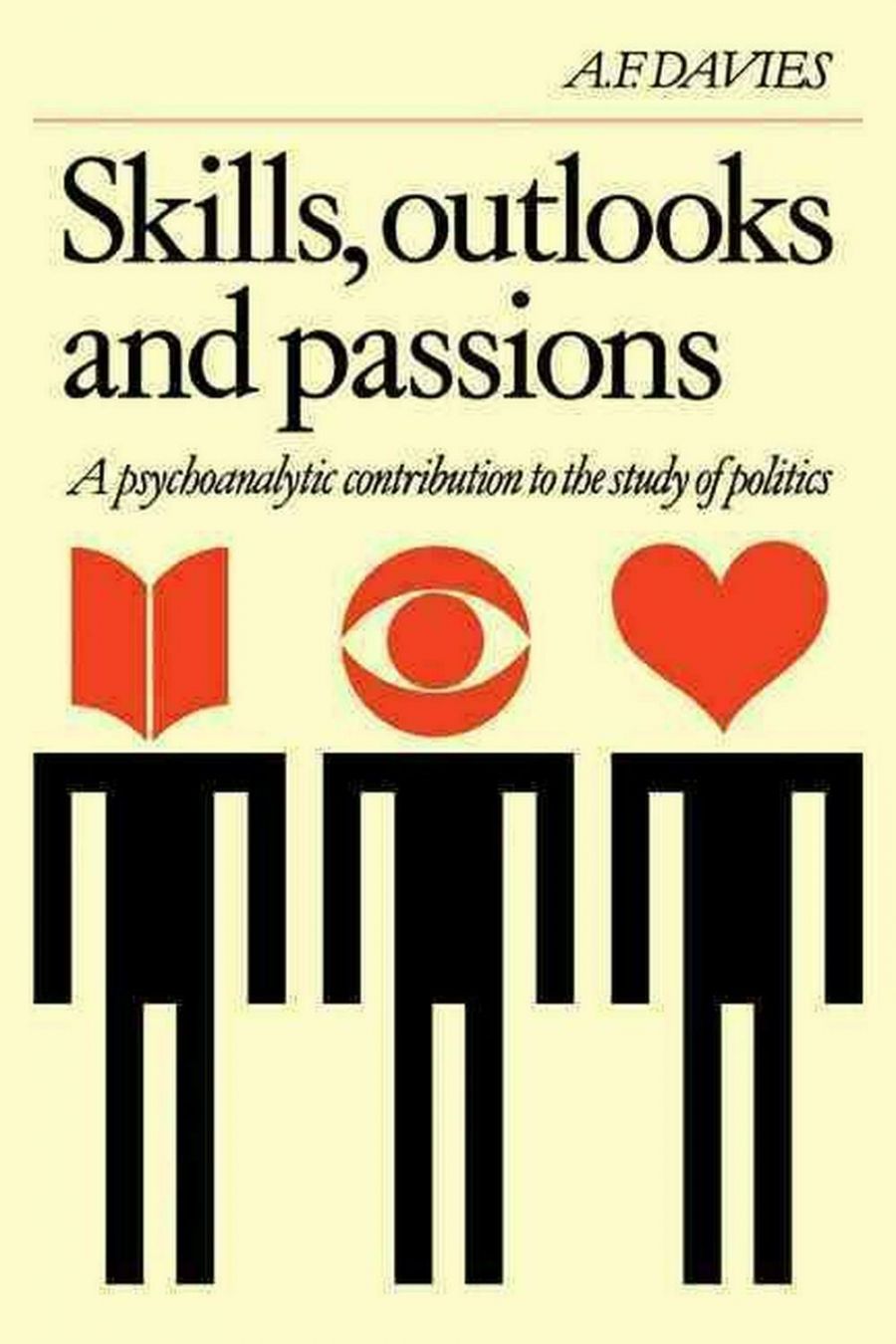
- Free Article: No
- Contents Category: Politics
- Review Article: Yes
- Custom Highlight Text:
There is a Melbourne school in the study of politics, a group of scholars whose work in biography, and in public opinion and public administration studies has been strongly influenced by psychoanalysis, and stresses the importance of unconscious motivation. The Melbourne school is a loose grouping; some of its members would deny that it has a leader, but it owes its existence, and much of its success, to Professor A.F. Davies of Melbourne University’s Political Science Department.
- Book 1 Title: Skills, Outlooks and Passions
- Book 1 Subtitle: A psychoanalytical contribution to the study of politics
- Book 1 Biblio: Cambridge University Press, $19.95 pb, 522 pp
It is written with grace and enthusiasm, but it is not easy reading. The author bounds ahead through the thickets and marshes of psychoanalytic theory and research, often stopping to point out surprising or delightful features of the landscape: most readers will follow ploddingly, feeling out of condition.
Those who follow politics as a spectator sport, and enjoy the jousting of Malcolm Fraser, Bill Hayden, Andrew Peacock, and Bob Hawke without inquiring closely into the skills and personalities of those leaders, into their own outlooks and passions, or anybody’s toilet-training, will be puzzled by this book. They are accustomed to see politics as part of the public masculine sphere, as macho as football, and here they are returned to the private feminine sphere, indeed to the nursery. Those with an aversion to psychoanalysis will be infuriated by the book.
Other readers will find it psychoanalysis at its least attractive; psychoanalysis as it was before the existentialists, the psychoanalytic sociologists, Lacan and the feminist critics; when the castrating mother and castrated father were the villains of the piece, and together were thought to produce an unholy brood of homosexuals, left-wingers, and fascists. Although Davies discusses contemporary political movements and recent research as well as the pioneering work of the postwar years, Davies rejects the newer trends in psychoanalysis itself.
I am out of sympathy with the author’s moral vision and with some of his use of psychoanalytic theory. For me, or me the value of this book lies in its erudition, the wonderful footnotes (but why is there no bibliography?), the questions which it asks and the connections it reveals. It is a book which any serious biographer needs.
The first section of the book deals with politics as work, dividing political workers according to Harold F. Lasswell’s typology into administrators, agitators and theorists. Davies himself is clearly a theorist; and theorists, he tells us, are distinguished by the use of intellectualisation as a prime defence, by a passion for judgement and poverty of affect.
The second part of the book deals with outlooks, the political philosophies or world views which we all possess. Here the classificatory scheme is taken from the work of Robert Freed Bales. The Bales scheme with its twenty-six personality types (set out in a book called Personality and Interpersonal Behaviour) began as a way of categorising behaviour in the’ self-analytic small groups which Bales ran at Harvard University.
Davies, in a chapter entitled ‘The Classification of World Views’, sorts thirty-five case studies from the literature of political psychology into the twenty-six types. It is a dazzling performance which enhances both the general scheme and the particular cases. However, the chapter also has major defects. Davies is not sufficiently critical in his approach to the Bales scheme and the case material. Moreover, he does not expound the scheme clearly. In particular, he does not explain the labels ‘up’, ‘down’, ‘backwards’, ‘forwards’, ‘positive’ and ‘negative’; nor does he justify the value judgements which they imply.
The case studies themselves vary greatly in quality. Cases studies cannot be written without selectivity and bias; but Davies, taking them as his basic data, owes us an explanation of how this selectivity and bias work, and how he proposes to minimise their effects.
The third part of the book investigates the political passions or, in the colder language of psychology, the political affects, from moral indignation to loyalty, pride, and trust. Davies describes his own study of a sample of students but, in the main, this is an essay of the literature of emotions. It is skimped in places. At its best it is reminiscent of Sir Richard Burton’s Anatomy of Melancholy.
The political emotions, says Davies, are essentially second-hand. We may think that politics excites us; in reality politics only serves to revive more ancient excitations, those of early childhood.
Davies, like Freud, is a moralist. The implicit message of the book is that most political views and activities are regressive and neurotic. However, the author denies holding this view. He says:
Another analogy seems preferable: politics as the symbolic projection of collective psychic tensions, doing for society what dreams, say, do for the individual. The political figure is then his culture’s instrument of selection, detection and creative expression … What work matters more?
The book does not sustain this conception of politics as symbolic. Politics are presented as regressive and neurotic. Anna N., an admittedly charming Italian tea-lady, is the only one of Davies’ cases to receive a clean bill of political health.
How then should we deal with our irrational political selves? Davies’ solution is the golden mean: in passion, moderation; in politics, liberal democratic values. I have doubts about the directions taken and the destination, but I enjoyed the journey.


Comments powered by CComment